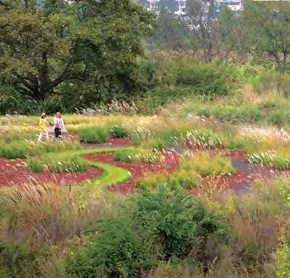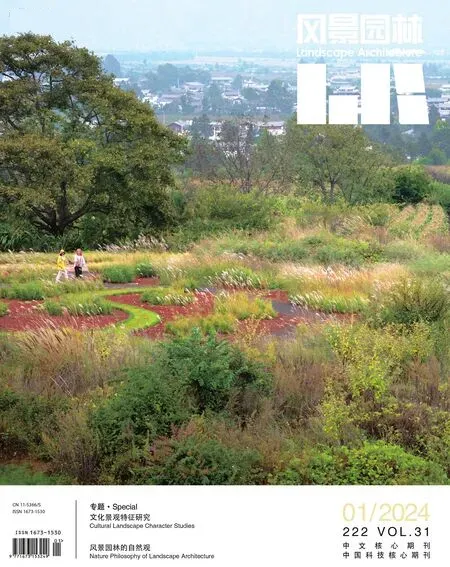文化景观的特征

马赛人是东非的半游牧牧民,在广阔的稀树草原上,马赛人与土地建立了深厚的联系。在肯尼亚和坦桑尼亚的马赛马拉,马赛人通过轮牧的方式,巧妙地避免了过度放牧导致的土地退化问题,使牧场得以再生,保持了可持续的平衡,让土地更富生机。他们传统生活方式的独特之处不仅在于畜牧业,还体现在对野生动物的保护上。马赛人与野生动物建立了共存关系,尊重了野生动物的迁徙习性,确保他们的文化习俗不会对该地区丰富多样的动植物群体造成侵害。他们居住的土地也是大象、角马等物种的家园,而马赛人的土地管理、可持续农业以及与野生动物和谐相处的智慧一直流传至今,凝结了数百年来与土地亲密互动的经验,形成了独有的文化景观。
农业景观在文化景观中扮演着重要的角色。中国梯田的形成源于古代先民对山地资源的精明利用。通过精心设计的梯田系统,人们展示了与土地的共生关系,巧妙的规划和耕作技术提高了对多山地区土地的利用效率。这些梯田如同被雕刻在山坡上,不仅是工程奇迹,更是一种对土地的智慧性开发,是中国农业文化独特表达的见证。梯田景观层次分明,融入了自然的美感,是人与土地相互依存的和谐之作。
文化景观是人类文明演进的瑰宝,是人与自然共同塑造的精彩篇章。全球各地的文化景观是漫长而复杂的互动过程的产物。人类与环境的互动,从原始的狩猎采集时代到现代都市文明,逐渐显现在各式各样的文化景观中。这些景观记录了人类社会的发展历程,反映了人类对自然环境的理解和利用。文化景观的特征不仅是历史的见证,更承载着人们对生存、信仰、艺术等方面的认知和表达,传递着人们对世界理解的特有信息。
文化景观特征的研究起源于20世纪80年代的英国。当时社会开始关注如何全面审视特定区域的景观组成要素,为未来的景观变化提供科学的管理框架和决策依据。对于文化景观的特殊性,需要一种系统性评估方法,能够深入了解城乡各种景观特征,以揭示不同地区的独特之处。英国率先推出了景观特征评估和历史景观特征识别,强调了空间分析、制图、类型学和专家指导。2000年,《欧洲景观公约》将景观定义为“人们感知的一个区域,其特征是自然和/或人类因素作用和相互作用的结果”,这一定义强调了景观不仅是物理维度上的存在,还是个人和社会赋予意义的结果,推动了景观特征评估的传播。
文化景观保护不仅是保护其自然特征,更是维护自然与文化之间的内在联系。这种保护工作必须深入了解这些景观中复杂的关系,超越单纯的维护。正如Gustavo Cordera所说,文化景观是自然与文化之间无形联系的可见表达。文化与自然领域之间无形的、复杂的联系超越了我们能看到的范围。当我们深入探究文化景观的复杂性,努力揭示这些超越可见的景观之美时,我们能更深刻地理解文化景观的特征,并制定适应性保护和管理策略,以促进我们与地球更智慧的、更可持续的共存。
Characteristics of Cultural Landscape
As a semi-nomad in East Africa, the Maasai have established deep bonds with the vast savannah.In Maasai Mara across Kenya and Tanzania, the Maasai have ingeniously avoided land degradation caused by overgrazing by the means of rotational grazing, thus regenerating their pastureland, maintaining a sustainable balance and making the land more vibrant.The uniqueness of their traditional way of life lies not only in animal husbandry, but also in the protection of wildlife.The Maasai have formulated a symbiotic relationship with wildlife, respected its migratory habits and ensured that their cultures and practices do not infringe on the rich and diverse flora and fauna across the region.The land they inhabited is also home to such species as elephants and gnus.The Maasai’s wisdom on land management,sustainable agriculture and harmonious coexistence with wildlife has been passed down to the present day, crystallizing their intelligence in intimate interactions with the land over centuries and shaping a unique cultural landscape.
Agricultural landscape plays an important role in cultural landscapes.The Chinese terraces were formed when ancient ancestors delivered a shrewd utilization of mountain resources.The elaborate system of terraces demonstrates a symbiotic relationship between human and land, and the ingenious planning and farming techniques boosted the efficiency of land use in mountainous areas.As if carved on hillsides, these terraces are not just an engineering marvel; rather,they are a kind of intelligent utilization of the land and a testimony to the unique expression of Chinese agricultural culture.The wellarranged terrace landscapes incorporate the beauty of nature, creating a harmonious work for the interdependence between human and land.
As a treasure of the evolution of human civilization, cultural landscape is a wonderful work coined jointly by human and nature.Cultural landscapes around the globe are a product resulting in the long and complex process of interaction.From the primitive huntergatherer era to the modern urban civilization, the interactions between human beings and the environment have gradually delivered a variety of cultural landscapes, which record the development of human society and illustrate humans’ understanding and utilizing the natural environment.The characteristics of cultural landscape are not only witnesses of history, but also bear humans’ cognition and expression in terms of survival, faith and art, among others, while conveying people’s unique messages on their understanding of the world.
Research into the characteristics of cultural landscape stemmed from the United Kingdom in the 1980s, when the society began to pay attention to how to comprehensively examine the landscape components in a specific region, so as to provide a scientific management framework and decision-making basis for future landscape changes.The particularity of cultural landscape entails a systematic assessment methodology to provide an in-depth understanding of various urban and rural landscape characteristics,in order to reveal the uniqueness of different regions.The United Kingdom takes the lead in assessing landscape characters and identifying historic landscape features, with an emphasis on spatial analysis, mapping, typology and expert guidance.In the year 2000,the European Landscape Convention defined landscape as “an area perceived by people, whose character is the result of the action and interaction of natural and/or human factors.” This definition underscores that landscape is not only an existence in physical dimensions, but also a result of meanings endowed by individuals and societies; thus, it has contributed to the spread of landscape characteristics assessments.
The conservation of cultural landscape is not only to preserve its natural characteristics, but also to maintain the intrinsic linkage between nature and cultures.In order to implement such conservation efforts, it is necessary to delve deep into the complex relationships within such landscapes by going beyond mere maintenance.As stated by Gustavo Cordera, cultural landscapes are the visible expressions of the invisible bonds between nature and culture.The invisible and complex connections between cultures and the natural realm transcend what we can spot.
When we make deep exploration into the complexity of cultural landscape and strive to uncover the beauty of such landscapes beyond the visibility, we may gain a deeper comprehension of the characteristics of cultural landscape and can develop adaptive conservation and management strategies, so as to boost a more sustainable and intelligent coexistence between humans and the Earth.
Editor-in-Chief: ZHENG Xi
January 5, 2024

